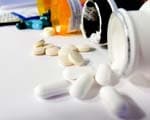People who take cholesterol-lowering statin drugs for at least one to two years appear to be less likely to develop gallstones.

Some gallstones are tiny, while others can be as large as a golf ball. Often they cause no symptoms, but if they become lodged in the wrong place - blocking the outlet from the gallbladder or pancreas, for instance - they can cause inflammation and severe pain.
People are prescribed statins to lower their cholesterol, which is one of the ingredients in gallstones. What's more, high cholesterol is tied to obesity, poor diet and other factors that can increase the risk of gallstones.
To investigate how statins impact gallstones, researchers reviewed nationwide data collected from 1.7 million people living in Northern Denmark. It was found that 32,494 people developed gallstones between 1996 and 2008.
But after accounting for diseases tied to gallstones, such as liver and heart problems, people with at least five statin prescriptions had lower rates of gallstones than people who didn't take the drug. Among those receiving at least five prescriptions for the drugs, the risk of developing gallstones fell by 11 to 24 percent - and more prescriptions led to a larger decrease. Those with 20 or more prescriptions, for instance, had a 24-percent decrease in their chances of developing gallstones compared with non-users. People, who had just started taking statins, meanwhile, had a higher risk of developing gallstones.
However, the study could not prove that statins directly caused the decrease. But in the specific issue of statins and gallstone disease, there is compelling evidence that long-term statin use reduces the risk of gallstone disease. Statins reduce the synthesis of cholesterol, so less cholesterol is excreted in the liver and the risk of gallstone disease eventually seems to decrease.
DoctorNDTV is the one stop site for all your health needs providing the most credible health information, health news and tips with expert advice on healthy living, diet plans, informative videos etc. You can get the most relevant and accurate info you need about health problems like diabetes, cancer, pregnancy, HIV and AIDS, weight loss and many other lifestyle diseases. We have a panel of over 350 experts who help us develop content by giving their valuable inputs and bringing to us the latest in the world of healthcare.












